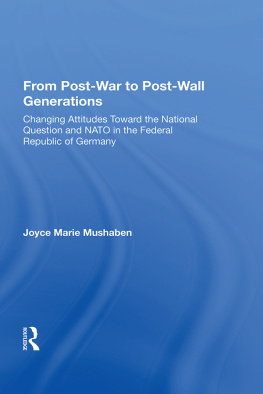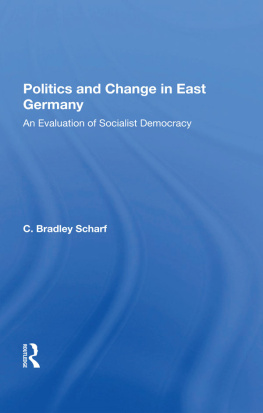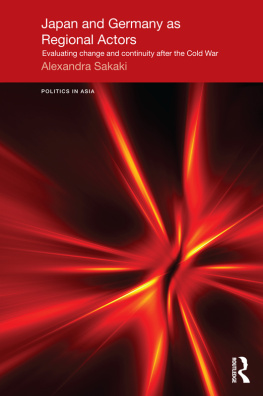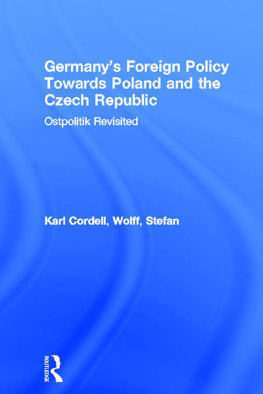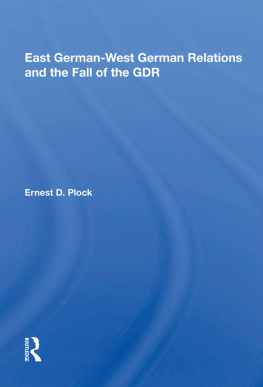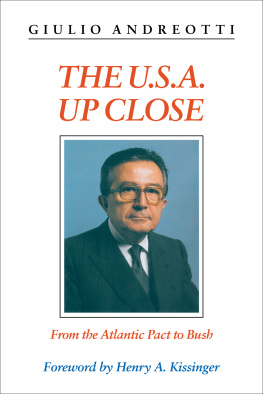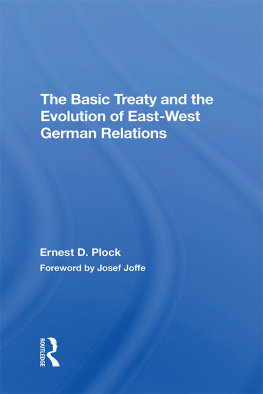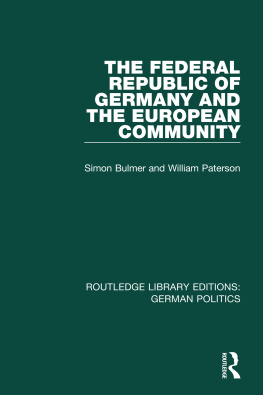From Post-War to Post-Wall Generations
First published 1998 by Westview Press
Published 2018 by Routledge
52 Vanderbilt Avenue, New York, NY 10017
2 Park Square, Milton Park, Abingdon, Oxon OX14 4RN
Routledge is an imprint of the Taylor & Francis Group, an informa business
Copyright 1998 by Taylor & Francis
All rights reserved. No part of this book may be reprinted or reproduced or utilised in any form or by any electronic, mechanical, or other means, now known or hereafter invented, including photocopying and recording, or in any information storage or retrieval system, without permission in writing from the publishers.
Notice:
Product or corporate names may be trademarks or registered trademarks, and are used only for identification and explanation without intent to infringe.
Library of Congress Cataloging-in-Publication Data
Mushaben, Joyce Marie, 1952
From Post-War to Post-Wall generations: changing attitudes
toward the national question and NATO in the Federal Republic of
Germany / Joyce Marie Mushaben.
p. cm.
Includes index.
ISBN 0-8133-1152-7
1. Political cultureGermany. 2. National characteristics,
German. 3. GermanyHistoryUnification, 1980. 4. National
securityGermanyPublic opinion. 5. North Atlantic Treaty
Organization. 6. GermanyMilitary policyPublic opinion.
7. Public opinionGermany. 8. GermanyForeign relations1990
I. Title.
DD290.29.M87 1998
943.087dc21
97-31491
CIP
ISBN 13: 978-0-367-00398-2 (hbk)
For Wally and Koko, for Hanni, Eddi, Peter, and Susanne, whose friendship and support have taught me over the years that there really is ein anderes Deutschland.
For Josefine, Milena, Tim, Jan, and Michel, who will reap the benefits of a new and peaceful German identity.
Much of my FRG-fieldwork linking new social movements activists and their long march through the institutions to processes of political-cultural transformation was executed during my eighteen months as a visiting scholar, generously sponsored by the Alexander von Humboldt Foundation from August 1985 through December 1986. An earlier phase of this project, focusing on the born-again peace movement, was directly supported by the Center for International Studies and the Political Science Department at the University of Missouri-St. Louis, July 1983 to January 1984. The University of Missouri-St. Louis and the Lenz Peace Research Laboratory also helped to finance updates of my project during subsequent summer research leaves.
I am most grateful for the expert advice and moral support proffered by the coundess assistants I encountered at a wide array of German research institutes and political foundations. While all merit my personal thanks, certain individuals deserve explicit mention here. They are: Dieter Roth of the Forschungsgruppe Wahlen ; Karl-Heinz Reuband, then at the Zentralarchiv fr Empirische Sozialforschung; Bertolt Meyer from the Hessische Stiftung Friedens-und Konfliktforschung ; Dieter Dettke at the Friedrich Ebert Stiftung ; and Hans Vorlnder, formerly with the Friedrich Naumann Stiftung.
Nor can I forget the extraordinary displays of patience and the occasional outpouring of hospitality extended by the many members of the Bundestag (especially Peter Conradi), journalists (above all, Theo Sommer), peace-movement coordinators (in particular, Jo Leinen), local officials and average citizens who agreed to become part of my in-depth sample over a turbulent two-year period. I think quite fondly of my personal affinity-group, a now-dissolved Wohngemeinschaft in Stuttgart-Sonnenberg, whose members reacted at first with amusement and later with amazement at my ability to turn many a casual dinner party into a heated speak-out over the deutsche Identitt no one had thought she or he possessed.
Formal words of thanks can hardly begin to repay the debt of gratitude I owe to another group of colleagues, not only for their comments on various portions of the manuscript but also for the professional insights they have shared across many years of personal friendship: Helga Welsh, Ann Phillips, Jutta A. Helm, Lily Gardner Feldman, Art Gunlicks, John Bendix, and Elisabeth Striibel. Heartfelt thanks also go to those who provided critical technical assistance linked to earlier drafts, including Mary Hines and Jan Frantzen at the University of Missouri-St. Louis and staff members at the American Institute for Contemporary German Studies, especially Lindsay Thompson Gould who taught me everything I know about Word Perfect 5.1. Last but not least, I thank my mother for urging me on whenever the project seemed overwhelming.
My obsession with detail notwithstanding, I am no more immune to the problem of human error than scores of identity experts who have preceded me with books of their own. I accept full responsibility for whatever typos, misinterpretations, exaggerations, and oversights are still to be found in the finished product, despite thoughtful recommendations to the contrary extended by my colleagues. Many readers may interpret this work as too politically provocative; others may judge it too personal in orientation. My greatest hope is that some readers will feel that I have captured the essence of German identity somewhere in between.
Joyce Marie Mushaben
Introduction:
The Evolution of National-Security Consciousness in the Postwar German Federal Republic, 19491995
A generation is not a handful of outstanding men (sic), nor simply a mass of men; it resembles a new integration of the social body, with its select minority and its gross multitude, launched upon the orbit of existence with a pre-established vital trajectory. The generation is a dynamic compromise between mass and individual, and is the most important conception in history. It is so to speak, the pivot responsible for the movement of historical evolution.
Ortega y Gasset (1974)
The catalyst for this work was not the breath-taking process of German unification, made possible by way of the 1989 revolutions in Eastern Europe, but rather the headline response to one politicians assertion, five years earlier, that German division had become an accepted fact of life.
Addressing a Communist Party forum in Rome in September 1984, Italian Foreign Minister Giulio Andreotti noted resolutely, There are two German states, and two they shall remain.Andreottis remarks in context. On the other side of the Berlin Wall, Erich Honeckers Socialist Unity government welcomed the declaration as a sign that its 30-year demand for de jure recognition was only fitting and just.
Like responses at the elite level which fell along conventional party lines, public reactions were somewhat divided. They seemed highly ambivalent for a citizenry long apprised of its constitutional obligation to achieve the unity and freedom of Germany in free self-determination. Very few of my FRG friends and colleagues openly approved of Andreottis assessment; most considered talk of reunification a gratuitous exercise. It was the latter group which piqued my interest. How could a relatively small, highly educated subset of West German citizens, well acquainted with the countrys traumatic past and very opinionated with regard to contemporary nuclear missile deployments, find the subject of their own national division hardly worth discussing? Having spent six months as a participant-observer in the West German peace movement during 1983, I was more attuned at the time to changing perceptions of the Federal Republics role in NATO than to questions of national identity per se. The link between the two issues began to emerge as I sought to explore the diffident reactions to Andreottis remark among my FRG peers.

